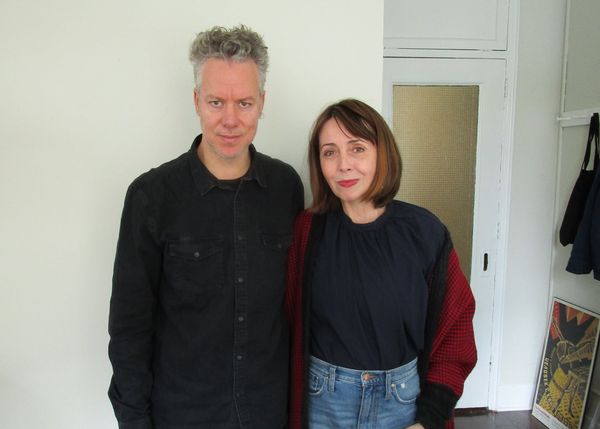Uruguay’s Oscar submission The Moneychanger (Así Habló El Cambista), directed by Federico Veiroj and co-written with Arauco Hernández Holz and Martín Mauregui is based on Juan Enrique Gruber’s novel Thus Spoke The Moneychanger and stars Daniel Hendler, Dolores Fonzi, Luis Machín, and Benjamín Vicuña with Germán de Silva (Pablo Giorgelli’s Las Acacias), Gabriel Perez, and David Roizner Selanikio.
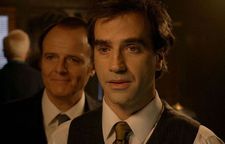 |
| Schweinsteiger (Luis Machín) with Humberto Brause (Daniel Hendler) |
During the 57th New York Film Festival, Federico Veiroj joined me for a conversation that led to a discussion of the production design by Pablo Maestre Galli, the editing by Fernando Epstein and Fernando Franco, the fashion of the Fifties, Simone Simon in Jacques Tourneur’s Cat People and Alain Delon in Joseph Losey’s Monsieur Klein, plus the connection to Friedrich Nietzsche in the title of the novel and the prologue that relates to Jesus.
Although we begin our journey following Jesus through the desert, hearing that "evil started with money brokers", this is not a religious tale. Our hero Humberto Brause (Daniel Hendler, who gives the character a special flair by having his mouth slightly open most of the time) finds his way in the complicated, simultaneously banal and dangerous money business of Montevideo, starting in the Fifties, ending in the Seventies.
His first employer, by the name of Schweinsteiger (Luis Machín), shows Brause the ropes of "wearing the vest" to bring money to Switzerland. He also has a daughter named Gudrun (a fantastically odd and convincing performance by Dolores Fonzi), who catches Brause's eye. Over cheese fondue, he explains to her that "all good things are stinky", and Gudrun, for the first of many times, doesn't take his misguided nonsense and orders something else. They end up marrying and having musically challenged, but enthusiastic kids.
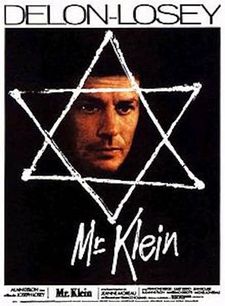 |
| Federico Veiroj on Monsieur Klein: “The acting of Alain Delon there is a masterpiece.” |
Left-handed forgeries, off-shore investing, a dangerous shopping trip to Buenos Aires in 1975, people with seven suitcases in their car, the funeral of an old prison mate, a tape with screams, extortion, the Amazonas 1970, torture threats - The Moneychanger leaps forward and backward in time. Greed, money and love, even Brause's hair seems stressed by the life he chose or has it chosen him?
Humberto Brause and Adam Sandler’s Howard in Josh and Benny Safdie’s frenetic and polished Uncut Gems would have a great deal to commiserate about.
Anne-Katrin Titze: You start with Jesus!
Federico Veiroj: Everything starts with Jesus.
AKT: It's a tremendous beginning for the film to come. It sets the tone, you eventually return to it. Was this always the start of your film?
FV: Yes. As you know, the film is based on a book called Thus Spoke The Moneychanger in the literal translation.
AKT: You didn't want to go into Nietzsche territory?
FV: No, but the thing is when I read the title of the book when I discovered it, I thought: Oh, what's that? Because of the reference to Nietzsche, of course. And I thought it was going to be funny. There's a prologue in the book that relates the passage of the psalm when Jesus came to Jerusalem. I thought it was funny to start a book like that because of the subject matter it was going to be about. In a way in the book it's justifying the character - that someone had to do the job of changing money. In the film we didn't want a victimised hero talk, we had him make the statement "We moneychangers, we are part of the evil of the world." To put it a little bit for nowadays.
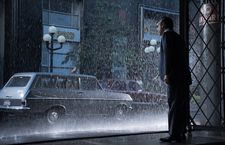 |
| Federico Veiroj on Daniel Hendler as Humberto Brause: “It's about that man in that world.” |
In any case, as you just said, the starting with Jesus is not only because of the novel. It's a very powerful image with the tables and Jesus throwing everything and also a mind set-up for the audience. Once you've seen that, everything can happen. The shock is done, for one minute, and then the film starts. It's a way of preparation for the narrative that is going to come. I thought it was very important for the eye, since you work for Eye For Film, to prepare the mind. Maybe some weird stuff could come.
AKT: We forget about this start and it comes as a very effective surprise when you return to it. And we get an extra explanation on what we had been watching.
FV: I like when it comes back, we know, of course it's an opera house and the guy is there and all his confession - he is thinking all that during this show. I like this sensation that he was in this theatre. It's the end of the place of the off-voice, of his inner voice.
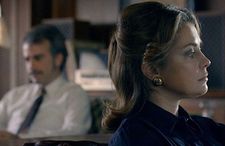 |
| Humberto Brause (Daniel Hendler) with his wife Gudrun (Dolores Fonzi) |
AKT: There are shifts in time. You are jumping around. The film takes place from the Fifties to the Seventies, more or less. But nothing is too specific. I liked very much the production design and the costumes and the saturated sense that you get.
FV: It was the idea of making these 25, 30 years time lapses with a particular tone. I didn't want to emphasise the particular period. Okay, that shirt is typically Fifties - I didn't want that in the fashion. Also because the film tells the story of a small financial district in Montevideo, suits and classic style.
And it was not New York, so you're not going to see the Fifties with Italian tailored men. It's not like a Mad Men kind of chic thing. No, it's South America in a small country and it's about that man in that world. Towards the end of the film there is more satire, it's also more comical.
AKT: There is also more horror happening in the world surrounding them. The political aspect of the time. These are the two sides. We are with the characters in this world with the mushroom-coloured walls and at the same time there is torture and abductions.
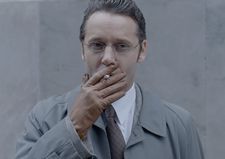 |
| Benjamín Vicuña as Javier Bonpland |
FV: Yeah, and if you are going to make the story of that period, that time in our continent, especially Argentina, Uruguay and Brazil, these three countries share dictatorship years. There were so many things happening but life goes on. We weren’t trying to make a story about torturers and we don't see a lot of military presence there. It's more that you know that's happening but we're seeing just the surface of it. Yeah, it's those two worlds that collapse in that moment.
AKT: Because you leave it up to us, it’s so much more powerful. The torture is more threatening, because you leave it to our brains to go there. It's like Cat People.
FV: You remember Monsieur Klein, the Alain Delon film?
AKT: Oh, yes.
FV: The war you didn't need to see. The people selling their stuff to this man. Of course the acting of Alain Delon there is a masterpiece. But you see all the ambiguity of the time inside his character. That's something that was in fact a reference for me in terms of the characters. What will be the moral you are going to follow?
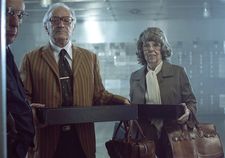 |
| Federico Veiroj on The Moneychanger: “Towards the end of the film there is more satire, it's also more comical.” |
In the case of Monsieur Klein, you are debating: Do I love this guy? Why am I following him? This is so weird, between a good thing or a bad thing. It's challenging to make a character like ours, because you're not looking for an instant love relation with the audience.
AKT: Tell me about the German names. Is it because they were so common at the time? One character's name is Schweinsteiger. Then there is Brause.
FV: Brause sounds German? it sounds Italian for us. There's been Italian immigration in Latin America, in Argentina especially and in Uruguay. The novel talks about the biography of the Italian immigrant and the condition of this character. I also wanted to keep from the novel the German immigrant thing before the Second World War; this man who came in the Thirties from Germany. The world that surrounds this man, the values of that man.
AKT: You are talking about Brause now?
FV: No, about Schweinsteiger. And Gudrun - it's more Nordic than German? Or is it German?
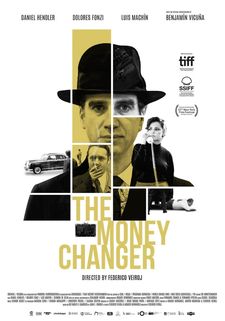 |
| The Moneychanger poster |
AKT: Very German. The music you include is Mahler and Mozart and Bach. The title of the book has a reference to Nietzsche, so of course, I am making connections with the names. 'Brause' means 'shower' in German.
FV: Oh, I didn't know that.
AKT: So, of course, I was wondering if there was a connection made to concentration camps.
FV: Oh, your mind went there! That's incredible.
AKT: And the other name - 'Schwein' means 'pig', So Schweinsteiger could mean a pig climbing. So I wondered if you were coding anything with the names.
FV: It's beautiful what you're saying. Of course we didn't know, we just liked the sound, the pronunciation.
AKT: That gave it an extra level.
FV: An extra level, especially for German speakers.








